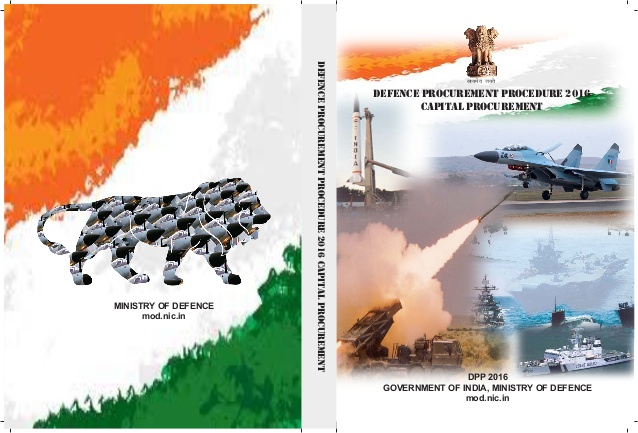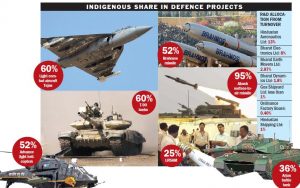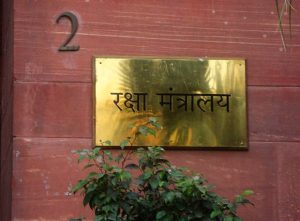
Image Courtesy: Ministry of Defence
https://bharatshakti.in/human-angles-of-defence-procurement/
Editor’s Note
DPP 2016 was hailed as a path breaking document. It was meant to loosen the reins of an overbearing bureaucracy, usher in transparency, speed up the procurement process, provide impetus for FDI in defence and a lot more. However, inspite of the new policy being quite path breaking, industry leaders have not stopped complaining, timelines for procurement continue to elude us and there seems to be yet too much bureaucracy in the business. The author refers to the human dimension that is decisive in making any process work and identifies lack of knowledge as being the greater impediment.
HUMAN ANGLES OF DEFENCE PROCUREMENT
The Defence Procurement Procedure 2016 was hailed as the panacea for defence procurement all ills that ail the procurement system. Admittedly, it is a great document. In fact multiple areas have been smoothened out while many hidden corners have been illuminated. But, there is a different take on it. The Indian Penal Code is also a great document and so is the Constitution of India. Notwithstanding the greatness of these documents, crime continues, inequality abounds and many social ills flourish unabated. Documents become great only due to the people who operate them. Our constitution is as great or weak as We The People abide by it or violate it. Similarly, the DPP 2016 will be as great or frail as the people who operate it. On a day-to-day basis we do not have to open it and keep referring to it when we transact business. In fact if we do so it will become an impediment without fail.
If our defence procurement has to succeed it has to be based on knowledge of the people involved in the entire chain. That is a primary and a fundamental fact. That is where we are the weakest. Everyone needs a knowledge set if procurement has to succeed; which is something besides the individual’s stated expertise. More importantly there has to be a realisation as to what we do not know and our frailties. And, of course how to rectify them.
The Uniformed Angle

Image Courtesy: ORF
Fundamentally, the man in the uniform knows what he wants. However, he does not know how to get hold of it. That’s simply because he knows how to use weapons and equipment but not how to procure them. So when he starts his innings on a procurement table, he is close to zero. By the time he starts to understand how to acquire what he seeks, he is on his way to his next assignment; never to return to this job. He also starts with a complete lack of knowledge as to how the government functions and how to deal with his civilian counterparts be it in government, R&D organsiations, PSUs or industry. He is full of straight lines, impatience and a restricted world view. He is also technically weak. As a result the internal technical bureaucracy of the Army overwhelms him and put him in a corner.
He also does not know how to deal with his own military bureaucracy. Before getting into a procurement job he needs re-education. I have heard many senior officers in the procurement chain say that their job is a great learning process and that they were blind about many things when they assumed their appointments. Well, we must realise that the business of weapon procurement and acquisition is not an adult education programme.
The Bureaucratic View
The civilian bureaucrat is a jack of all trades and master of none. His asset is that he has a great sense of how government works. He starts with a less than zero knowledge base of the plethora of sophisticated weapons which are to be acquired. Invariably, he starts learning from scratch on all fronts. He has doubts where there should be none. He sees ghosts in most cases. He starts questioning the basics. From an enabler he becomes a block or router. When in doubt he will route the case in a loop or raise a query to slow down the entire processes. He avoids taking accountability for anything.
Decision making is not his forte and risk taking is anathema. The major problem is that he has no commitment to a cause he does not understand. For him it is a case, and every case is equal. Procedure is important, outcome driven thinking is rare. The financial bureaucrat assumes significance beyond need. He will always quote financial propriety and past scandals to look at cheaper options. Quality is not his concern.
The Research Corner
The R&D man wants projects. He understands what he wants. Invariably he will give you what he can from what he has understood. He revels in aloofness. Very importantly, he is a stays at his post long; there is a permanency about him. He has capabilities but does not want to stretch his imagination. For him the product is an end point in itself. Whether it’s useful on ground or not is not his concern. He feels that the user always shifts goal posts and that his product is the best. Sense of time is not his forte. He will promise something which he knows he cannot deliver and announce to the world that he has finished the product when it is less than half baked. Most importantly, even when he succeeds in his research and comes out with a product; he does not know how to productionise it. He is best when he is interconnected with and driven by the user. He is underutilised.
Industrial Imbroglio
The bane of the public industry and the production agencies is lack of quality. In agencies like OFB or a PSU, quality and time are major problem areas. They have no mechanism or will to improve. They want orders at the earliest and insist on monopoly. Delivery at the latest with poor quality and no back up is the norm. Their personnel simply have no connect or even a desire to connect with the users. They prefer to remain disconnected since that’s their comfort zone. They invariably deliver less than what is promised. Additionally, the products from the public undertakings are heavily overpriced and unreliable. The combination of late delivery, poor quality and highly outrageous cost impinges heavily and reduces operational preparedness. Hence, the user has little faith in our public enterprises.

Image Courtesy: IndiLens
The private industry man is the new entrant in this field. He feels that his job is to bag orders and does not know that he has severe limitations. Since Make in India is the latest buzz word and since the private man knows that margins in defence are high, he is eager to get on to the bandwagon in any manner. The biggest danger posed by the private industry is their lack of knowledge combined with refusal to acknowledge it or improve.
Many of them are in the business of rebranding or becoming well packaged middlemen for foreign vendors. Investment into research is anathema even for bigger players in the field. They have a long way to go before they can come up to the requirements. The danger with the industry, whether it is public or private, is that the cost to the exchequer is high. Indian industry is way too costly compared to foreign players. If Indian industry means business it has to focus on pruning costs too.
Quality Unconcerned
The hidden jack in the pack is our organization called the DGQA. Invariably this organisation converts a sprint into a hurdling race in all matters of procurement by placing hurdles at every stage of our procurement chain. It is non transparent. The entire system does not know whose purpose it is serving. The people whose purpose it is to serve have very little faith in it. It’s manned by average people whose functioning and organization is opaque. It needs a major revamp in terms of manning, structuring, command and control.
The Time Dimension
There is a major underpinning factor which in our system is a black hole. That is – time consciousness. Time is money plus capacity – gained or lost. Earlier done, cheaper it is and capacity enhanced. Later done implies acquisition at a greater cost and non-availability of capacity till it is realised. Additionally, if the time factor is stretched beyond limits the capacity may no longer be required or the goal posts might change to make that capacity irrelevant. Goal posts change since the ground configurations for operations change or the technology becomes irrelevant. This is a bane of our procurements. Of course, as cases keep piling up due to time overruns they lose direction, and the friendly neighborhood Spiderman starts building cobwebs.
Pondering Ahead

Image Courtesy: Rediff
In essence, it is quite obvious that some of the human realities outlined above are a drag on our defence procurement and the objective of equiping the man with his machine. Any DPP, including DPP 2016, will not solve our problems. In fact, it will only compound issues if our defence professionals do not know how to handle it. If we look beyond the obvious it is pretty clear that if we are to be successful we need to learn our trade. We have think on a common platform where our strengths are reinforced, individual weaknesses are bridged through common knowledge. Our defence verticals which operate as independent, non-cooperating silos need major two-way connectivity at top, middle and grassroots levels.
It’s time the Government takes stock of the situation and starts thinking of how to educate our procurement professionals and make them a holistic workforce rather than continuing with them as a set of disjointed individuals with poor knowledge and poorer teamwork. The procurement machinery can never lose sight of whom it serves – the man on ground. That in essence is the prime objective of this article.
Lt Gen P R Shankar ( Retd)
(Disclaimer: The views and opinions expressed in this article are those of the author and do not necessarily reflect the official policy or position of BharatShakti.in

Comments
Post a Comment